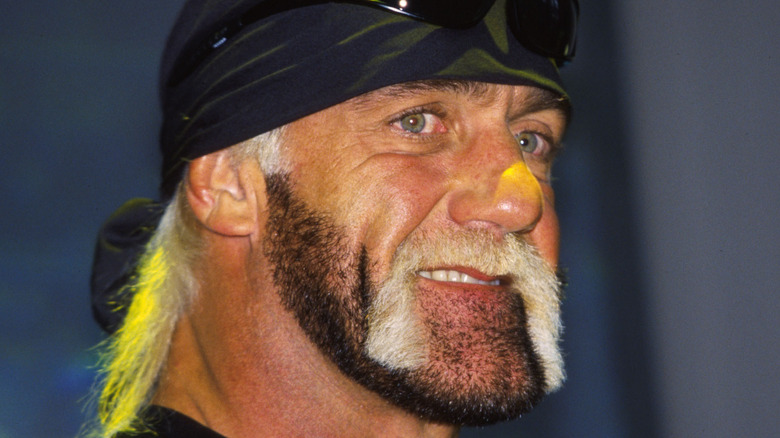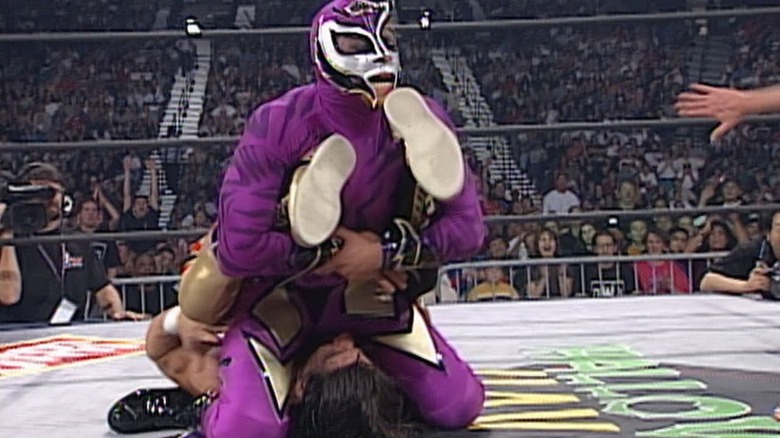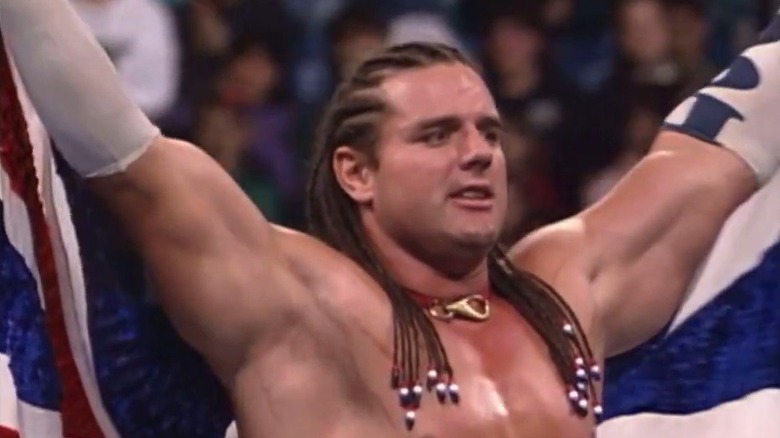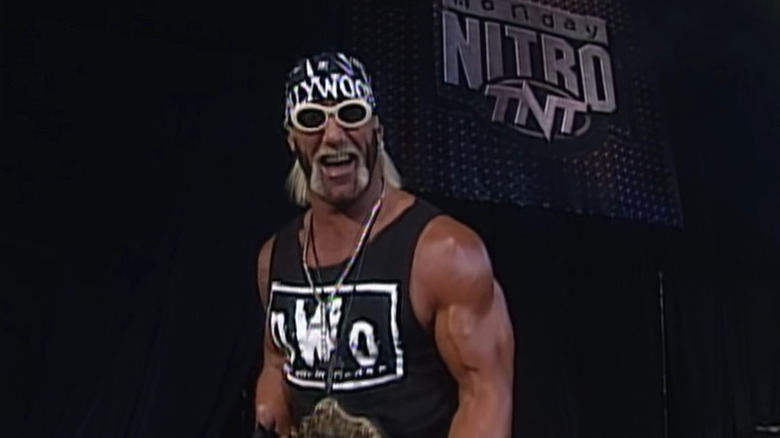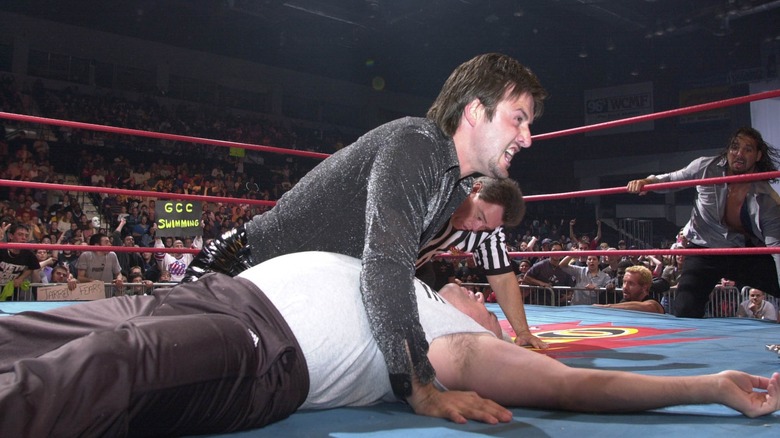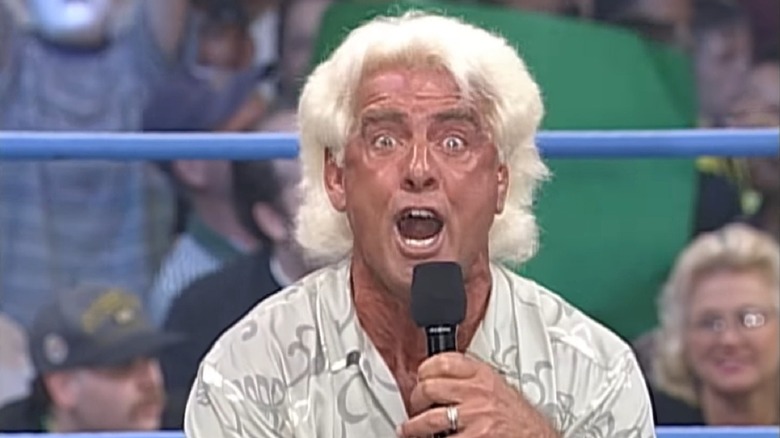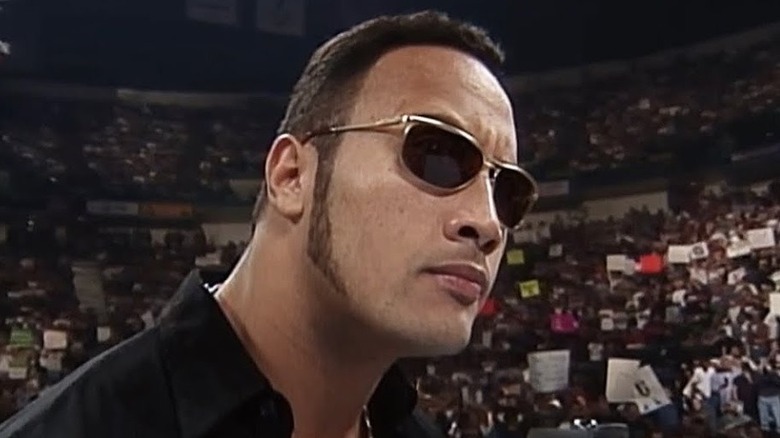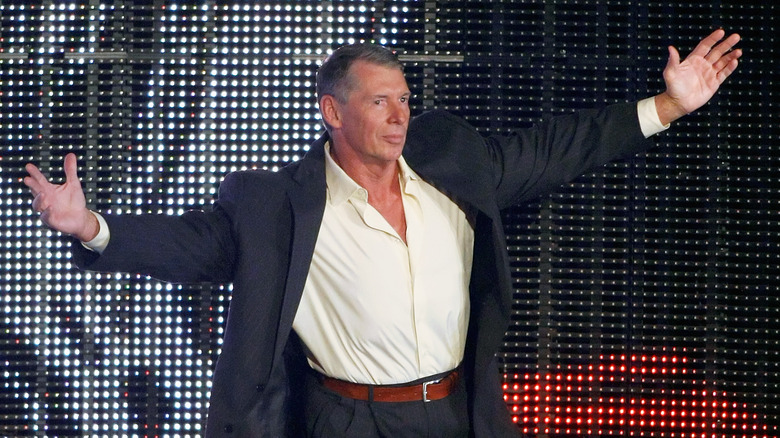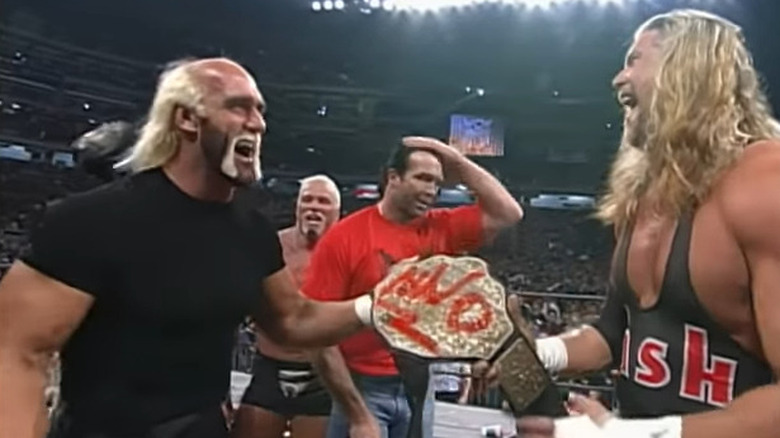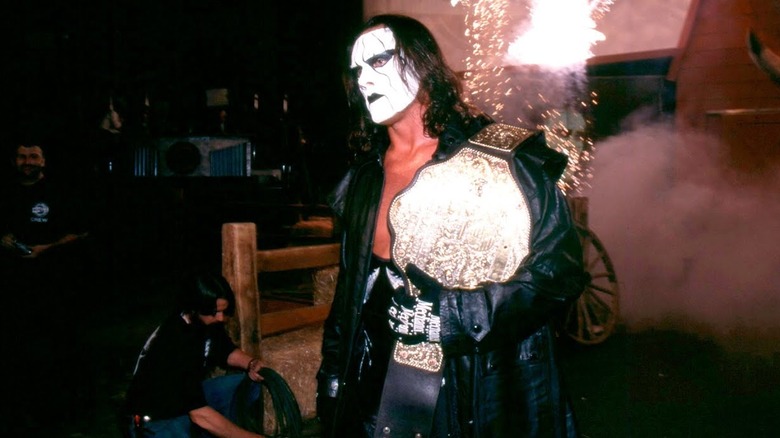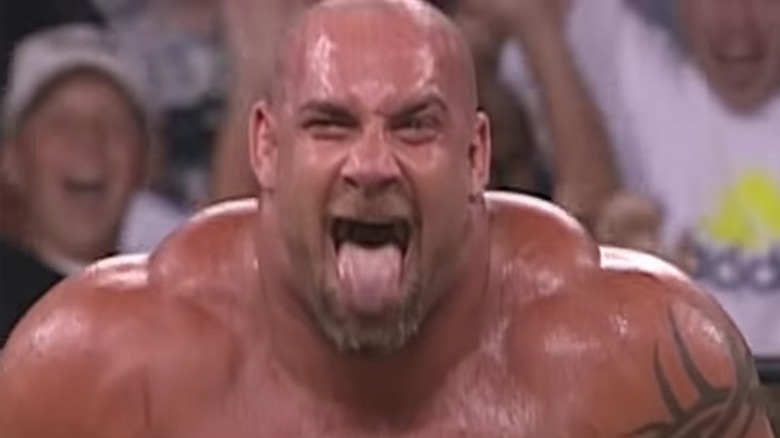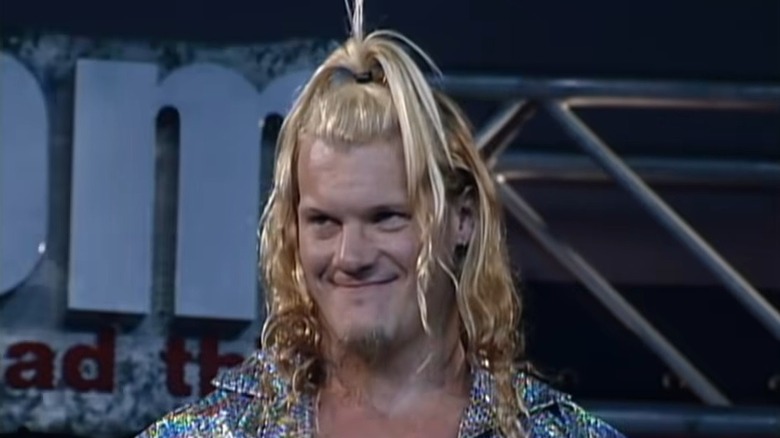The Biggest Differences Between WCW And WWE Explained
Wrestling is a lot like pizza; we can't go wrong with it and it's always tasty, but everyone has their own specific preferences. Some might prefer it a little cheesy and thin in the middle, while others want all the toppings and flavors since it's all about quantity and presentation. In the '90s, wrestling fans received their fill by choosing between the big two: WWE (then-WWF) and WCW. While these two promotions had similar letters, primetime shows on Monday nights, and even shared talent over the years, they were wildly different from each other.
Of course, Vince McMahon put an end to the competition when he purchased WCW in March 2001 (via CNN Money). However, its legacy isn't forgotten. It was seen as the last resistance of its era, showing that — like pizza — the more variety there is, the better it is for fans, wrestlers, and promoters in the long run. That isn't to say that one company was better or worse than the other; they just had different ways of operating and showcasing their product. So let's step into our time machine, pack our Nintendo 64 games and VHS collection for the long ride, and take a glance at all the major differences between WCW and WWE.
The cruiserweight influence ran deep on one side
It's been well documented how Vince McMahon loves bodybuilder types, though it should come as no surprise considering how much he loves to lift too. Throughout the WWE's history, it became clear that he preferred bigger heavyweights, such as Hulk Hogan and the Undertaker, as the faces of the federation rather than the smaller men. While Bret "The Hitman" Hart and "The Heartbreak Kid" Shawn Michaels were the notable exceptions to the rule here, McMahon generally put his trust in those who could flip trucks and flex for the press.
On the other hand, WCW's Cruiserweight division was one of the most exciting parts of its roster. The likes of Dean Malenko, Eddie Guerrero, and Rey Mysterio became household names and worldwide superstars, thanks to the emphasis and time invested on the smaller performers. While the WWE experimented with the Light Heavyweight Championship and bringing in its own cruiserweights, it never reached the standard or received the same recognition as WCW's division. That said, the bouts between Taka Michinoku and Brian Christopher were some of the best parts of WWE television in 1997, even if they didn't always get the plaudits they deserved.
The WWE's international presence
While WCW and WWE went toe-to-toe in the United States, only one of them put effort into growing its international audience — and when we refer to international, we're saying further than Canada or Mexico. WCW focused its energy on winning the Monday Night Wars, ensuring that Americans were choosing to tune in to the likes of Hulk Hogan, Sting, and the nWo instead of Shawn Michaels, Goldust, and the Undertaker on the other channel. Yet, this was where Vince McMahon and the WWE proved to be smarter, looking at the bigger picture and the effects of globalization on its burgeoning audience.
WWE expanded its presence into international territories heavily in the '90s. From hosting SummerSlam 1992 at Wembley Stadium, England, to holding the tournament to crown the first European Champion throughout Europe (via WWE.com), the company understood the value of the international audience watching its product and catered to them as well. WWE also understood the importance of breaking into other untapped markets such as Africa. In fact, WWE had to add extra dates to its tour of South Africa in the mid-1990s due to the shows selling out so fast.
Here comes the money!
So Hulk Hogan, Kevin Nash, and Goldberg walk into a bar ... They now own it. That was essentially the model that WCW operated on, as it wasn't afraid to splash the cash to get (and retain) the talent. Chatting on "The Bro Show" (via Sportskeeda), Diamond Dallas Page and Vince Russo credited Kevin Nash and Scott Hall for changing how wrestlers were paid in the industry due to their unique contracts. "[Nash] knew favored nations [clauses], which means if you go to a movie script and they sign you early and you look like you get good money, and they bring somebody [who earns more], [you] make the same money he makes," Page said.
While WWE wasn't exactly handing out gift vouchers and six packs as payments, Vince McMahon knew when to walk away and ensured that no star was bigger than the company. In 1997, the WWE experienced tough financial times and he realized that he wouldn't be able to honor Bret Hart's mammoth multi-year deal, so he let him out of his contract, even if he knew Hart would be on the way to WCW. That said, he still gave him a parting gift in the form of the Montreal Screwjob.
D-Generation X vs. The New World Order
While the core members of the infamous Kliq were responsible for the formation of both D-Generation X and the New World Order, the two groups were radically different in their presentation. Sure, one could argue that DX was formed as a reaction to the success of the nWo, but the way they operated couldn't have been further apart.
When the nWo appeared, the premise was simple: They wanted to take over WCW. In the early stages, it was alluded to that they were composed of ex-WWE forces; however, it soon became an angle where the nWo wanted to become the new face of WCW and acted like a gang that were "too sweet." For DX, it was simply about crotch chops and being rebels without a cause. They relied on sophomoric and insulting humor to get their point across and generally disrupted proceedings because they could. They weren't in the business of expanding their enterprise, either, since the faction's membership didn't extend as far as the nWo's did. This all changed when WWE bought WCW and the nWo and DX became as interchangeable as the WWE 24/7 Championship.
The booking system
In 2013, Booker T revealed details about the night in which he became WCW World Champion at Bash at the Beach 2000. Speaking to Wrestling Inc., Booker noted that he only found out he was going over mere minutes before the match. The reason for the uncertainty? Hulk Hogan. "The beef was with [Vince] Russo and Hogan and creative control Hogan had in his contract — I'm not sure exactly what that was," Booker said. "But I knew that Hogan wanted to win the title that night." That was pretty much an average night in WCW, as the inmates ruled the asylum. There were several wrestlers with creative control in their contracts and they never wanted to be booked to look weaker or to do the job for their fellow performers. So there would be endless discussions and arguments about the direction of shows and match finishes.
On the other hand, Vince McMahon never relinquished creative control in the WWE. While the likes of the Kliq certainly liked to whisper their suggestions in McMahon's ear, he never allowed the wrestlers to become more powerful than him. He would welcome ideas from the wrestlers and others, but he ruled the creative of WWE with an iron fist.
Performances per year
What's the one thing more than money that every single wrestler wants? A lighter work schedule. Considering the physical toll that it takes to perform on a regular basis and all the travel required to get to the shows, many wrestlers would likely negotiate a lower salary if they were able to perform less. Well, WCW sweetened the deal for its signings by not only offering a lighter schedule, but also more money than the WWE (via The Score). That's the ultimate win-win scenario.
When WCW poached established WWE stars such as Hulk Hogan and Randy Savage, it understood what the wrestlers wanted at that point in their respective careers. So instead of bruising and battering them as they went around the world in 80 days, the promotion protected its performers by giving them a set number of dates and guaranteed paydays. As a result, many WWE superstars jumped ship at the first opportunity because they wanted a taste of the stylin', profilin', limousine-riding, jet-flying, kiss-stealing, wheelin' and dealin' good life.
Personality vs. wrestling ability
There's a common debate nowadays: Do we refer to these in-ring performers as pro wrestlers or sports entertainers (or wizards in the case of Chris Jericho)? The start of this argument can be traced back to the presentation of WWE and WCW. Even though the term "wrestling" wasn't banned in the WWE like it is now, there was a drive to create more personalities than sportsmen in the '90s, hence some of the outrageous gimmicks like Duke "The Dumpster" Droese and The Repo Man. WCW valued itself as a wrestling organization and had many performers who weren't comfortable on the mic but were incredible in the ring. That said, it experienced a sudden change in this dynamic when Vince Russo joined the company and brought some of his more "creative" ideas along with him.
Appearing on "Stories With Brisco and Bradshaw", Booker T explained the main difference he encountered when he joined WWE. "When I came to WWE the first thing they did with me was put me in a position where it was all about character building: 'Let's see exactly how good of an entertainer this guy could be.' And with wrestling that's what it is," he said.
Vince McMahon never lost control
While the Monday Night Wars positioned the battle as Vince McMahon's WWE versus Eric Bischoff's WCW, it wasn't so clear cut in the boardrooms. McMahon always maintained control of the WWE, whereas Bischoff reported to the Turner Broadcasting suits and had his handlers. There were several people above Bischoff in the food chain and they had a say in how the company was run.
In the years after the demise of WCW, Bischoff has gone on record to state that he was overridden at boardroom level several times. Despite Bischoff successfully making WCW a direct competitor of WWE, there was still interference and suggestions of what he should have been doing differently. For McMahon, the WWE wasn't a publicly traded company at the time, so the buck stopped with him. Even when the WWE experienced a dip in popularity and lost the Monday Night Wars to WCW, there wasn't a major overhaul or knee-jerk reaction that's often found from big companies. McMahon held his nerve and realigned in the way he wanted to, instead of having the control taken away from him.
The number of factions
We all need to find someone who loves us as much as WCW loved factions. There was a time when nearly everyone in the promotion was in some faction or the other. In fact, even the nWo had factions of its own factions, such as the nWo Wolfpac and the Latino World Order; it became impossible to keep track of who was part of which clique, really. Yet, this obsession with groups had been prevalent for years before the formation of the nWo, as the WCW pushed the likes of the Four Horsemen, the Dangerous Alliance, and the Dungeon of Doom.
For the WWE, factions were rare in the mid-'90s, with Camp Cornette and the Million Dollar Corporation being the more memorable ones. It wasn't until 1997 that the WWE got in on the action and turned the landscape into a gang war with the likes of The Hart Foundation, D-Generation X, the Nation of Domination, Los Boricuas, and the Disciples of Apocalypse taking up the bulk of the television time.
Established stars and the new generation
When the WWE lost the likes of Hulk Hogan and "The Macho Man" Randy Savage to WCW, there was a fear among fans that Vince McMahon had given his biggest stars to his greatest rival. Their departures might have hurt the WWE initially, but McMahon had a plan and created new stars. With the veterans moving on, it opened up the spotlight for performers such as Diesel (Kevin Nash) and Razor Ramon (Scott Hall) to step up to the plate. Again, when WWE lost these stars to WCW, it created a batch of new ones in the form of Dwayne "The Rock" Johnson and "Stone Cold" Steve Austin.
Instead, WCW built its roster around recognizable and established names. It hardly pushed new stars — Goldberg being the major exception here — as the focus stayed on the old guard and their place on the pecking order. In the end, it was a decision that harmed the company, because how many times could the audience see Hogan versus Sting in a main event before it became staler than three-month-old bread? Ironically, WWE is experiencing the same issue now, as it struggles to create new main event stars.
Homegrown talent
While the WWE was far more successful in creating new superstars, here's the rub: Most of them were from the territories and not developmental homegrown talent. In those days, the WWE didn't have an NXT to nurture its upcoming performers, and OVW only started coming into play towards the end of the '90s. Instead, Vince McMahon and his team operated like scouts, having to keep a lookout for potential talent and signing them up before anyone else could.
In contrast, WCW had the Power Plant — a wrestling school based in Atlanta, Georgia. Numerous talent in pro wrestling honed their skills at this facility, being taught by the likes of Ole Anderson, Paul Orndorff, and Debrah Miceli. However, the biggest WCW main event talent to come out of this wrestling factory was none other than Bill Goldberg. There was a stream of performers who came out of the Power Plant and even tasted championship success, such as the Giant (Paul Wight), but no one had the stratospheric levels of success that Goldberg experienced.
WCW's flops became WWE legends
As touched upon before, WCW's fatal mistake was keeping its cameras only on the established names, failing to elevate other performers to the main event scene. Even when the WWE stars jumped ship to Atlanta, Georgia, they were already recognized faces among the wrestling community and didn't need any major booking pushes. WCW wasn't in the business of making stars; it just bought them ready made like microwavable mac and cheese.
At the same time, it allowed many talented performers to slip through the cracks or simply released them because no one believed they were good enough to be higher up the card. However, one man's trash ends up becoming another's treasure, and WWE certainly unearthed Davy Jones' chest of jewels. Vince McMahon recognized the ability of performers such as Triple H, "Stone Cold" Steve Austin, and Chris Jericho and signed them up immediately. Instead of letting them linger around in the mid-card until their contracts expired, the WWE invested time and energy into these wrestlers, transforming them from WCW flops into wrestling legends.
